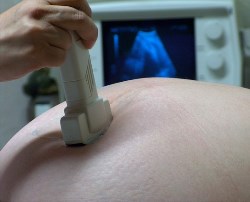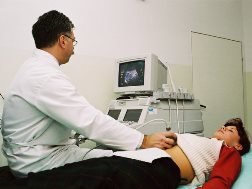How to Choose the Best Sonogram Tech School near Death Valley California
 Since you have made a decision to pursue an ultrasound technician degree near Death Valley CA, it’s time to begin the procedure of choosing a school. First, you must find the ideal program that will provide the proper instruction to become a skilled professional. And given that some states do require that ultrasound techs be either certified or licensed, depending on where you will practice you may also need to be prepared to pass a certification or licensing exam. So it’s extremely important that you investigate each program so that you can evaluate and compare your options. But exactly where does one begin? Most students will begin by searching for colleges that are within driving distance of their homes and then by comparing tuition. Of course location and cost must be taken into account when making a decision, but there are other critical factors also. For example, if the ultrasound technician schools have earned accreditation or if they sponsor internships. These and additional qualifiers will be covered more in depth later in this post. But first, let’s go over what an ultrasound tech does and the degrees and online education options that are available.
Since you have made a decision to pursue an ultrasound technician degree near Death Valley CA, it’s time to begin the procedure of choosing a school. First, you must find the ideal program that will provide the proper instruction to become a skilled professional. And given that some states do require that ultrasound techs be either certified or licensed, depending on where you will practice you may also need to be prepared to pass a certification or licensing exam. So it’s extremely important that you investigate each program so that you can evaluate and compare your options. But exactly where does one begin? Most students will begin by searching for colleges that are within driving distance of their homes and then by comparing tuition. Of course location and cost must be taken into account when making a decision, but there are other critical factors also. For example, if the ultrasound technician schools have earned accreditation or if they sponsor internships. These and additional qualifiers will be covered more in depth later in this post. But first, let’s go over what an ultrasound tech does and the degrees and online education options that are available.
Click Here to Get Free Information on Ultrasound Technician Schools!
Sonogram Tech Job Summary
 There are multiple acceptable titles for ultrasound techs (technicians). They are also referred to as sonogram techs, diagnostic medical sonographers (or just sonographers) and ultrasound technologists. Regardless of name, they all have the same basic job description, which is to perform diagnostic ultrasound testing on patients. Although many practice as generalists there are specializations within the field, for example in cardiology and pediatrics. Most work in Death Valley CA hospitals, clinics, private practices or outpatient diagnostic imaging centers. Typical daily work duties of a sonogram technician may consist of:
There are multiple acceptable titles for ultrasound techs (technicians). They are also referred to as sonogram techs, diagnostic medical sonographers (or just sonographers) and ultrasound technologists. Regardless of name, they all have the same basic job description, which is to perform diagnostic ultrasound testing on patients. Although many practice as generalists there are specializations within the field, for example in cardiology and pediatrics. Most work in Death Valley CA hospitals, clinics, private practices or outpatient diagnostic imaging centers. Typical daily work duties of a sonogram technician may consist of:
- Maintaining records of patient case histories and details of each procedure
- Counseling patients by explaining the procedures and answering questions
- Preparing the ultrasound machines for usage and then cleaning and recalibrating them
- Escorting patients to treatment rooms and making them comfortable
- Using equipment while minimizing patient exposure to sound waves
- Evaluating results and identifying need for additional testing
Sonographers must routinely gauge the safety and performance of their equipment. They also are held to a high ethical standard and code of conduct as medical practitioners. In order to sustain that degree of professionalism and remain up to date with medical knowledge, they are required to enroll in continuing education programs on a regular basis.
Sonogram Tech Degrees Available
 Sonogram technician students have the choice to acquire either an Associate or a Bachelor’s Degree. An Associate Degree will normally involve about 18 months to 2 years to accomplish dependent on the course load and program. A Bachelor’s Degree will require more time at as long as four years to finish. Another option for those who have previously obtained a college degree is a post graduate certificate program. If you have obtained a Bachelor’s Degree in any major or an Associate Degree in a related health sector, you can enroll in a certificate program that will take only 12 to 18 months to finish. One thing to consider is that almost all sonographer programs do have a practical training component as part of their course of study. It can often be fulfilled by participating in an internship program which numerous schools set up with Death Valley CA hospitals and clinics. When you have graduated from any of the certificate or degree programs, you will then have to satisfy the licensing or certification requirements in California or whatever state you choose to practice in.
Sonogram technician students have the choice to acquire either an Associate or a Bachelor’s Degree. An Associate Degree will normally involve about 18 months to 2 years to accomplish dependent on the course load and program. A Bachelor’s Degree will require more time at as long as four years to finish. Another option for those who have previously obtained a college degree is a post graduate certificate program. If you have obtained a Bachelor’s Degree in any major or an Associate Degree in a related health sector, you can enroll in a certificate program that will take only 12 to 18 months to finish. One thing to consider is that almost all sonographer programs do have a practical training component as part of their course of study. It can often be fulfilled by participating in an internship program which numerous schools set up with Death Valley CA hospitals and clinics. When you have graduated from any of the certificate or degree programs, you will then have to satisfy the licensing or certification requirements in California or whatever state you choose to practice in.
Online Ultrasound Tech Schools
 As earlier discussed, virtually all ultrasound tech schools have a clinical component to their programs. So while you can obtain a degree or certificate online, a substantial portion of the training will be either held in an on-campus laboratory or at a sponsored off campus facility. Clinical training can often be fulfilled through an internship at a local Death Valley CA hospital, outpatient clinic or family practice. However the balance of the training and classes can be accessed online in your Death Valley home. This is especially convenient for those individuals that keep working while earning their degrees. In addition online colleges are frequently more affordable than traditional options. Expenses for study materials and commuting can be decreased also. But similarly as with every sonographer school you are reviewing, make sure that the online program you ultimately pick is accredited. One of the most highly regarded accrediting organizations is the Commission on Accreditation of Allied Health Education Programs (CAAHEP). Accreditation is especially important for certification, licensing and finding employment (more on accreditation later). So if you are disciplined enough to learn away from the classroom in the comfort of your own home, then online classes may be the ideal option for you.
As earlier discussed, virtually all ultrasound tech schools have a clinical component to their programs. So while you can obtain a degree or certificate online, a substantial portion of the training will be either held in an on-campus laboratory or at a sponsored off campus facility. Clinical training can often be fulfilled through an internship at a local Death Valley CA hospital, outpatient clinic or family practice. However the balance of the training and classes can be accessed online in your Death Valley home. This is especially convenient for those individuals that keep working while earning their degrees. In addition online colleges are frequently more affordable than traditional options. Expenses for study materials and commuting can be decreased also. But similarly as with every sonographer school you are reviewing, make sure that the online program you ultimately pick is accredited. One of the most highly regarded accrediting organizations is the Commission on Accreditation of Allied Health Education Programs (CAAHEP). Accreditation is especially important for certification, licensing and finding employment (more on accreditation later). So if you are disciplined enough to learn away from the classroom in the comfort of your own home, then online classes may be the ideal option for you.
What to Ask Ultrasound Technician Colleges
 When you have decided on the type of certificate or degree that you would like to earn, you can initiate the procedure of reviewing and comparing sonogram technician colleges. You will first probably want to choose whether you would rather attend classes online or commute to a college campus in the Death Valley CA area. Naturally location will be significant if you decide on the latter, and the cost of tuition undoubtedly will be an initial qualification also. But there are additional things that you should also take into consideration, for example if the schools are accredited and if they provide internship programs. So in order to complete your due diligence so that you can make your ultimate selection, following are a few questions that you may want to ask each sonography college prior to making a decision.
When you have decided on the type of certificate or degree that you would like to earn, you can initiate the procedure of reviewing and comparing sonogram technician colleges. You will first probably want to choose whether you would rather attend classes online or commute to a college campus in the Death Valley CA area. Naturally location will be significant if you decide on the latter, and the cost of tuition undoubtedly will be an initial qualification also. But there are additional things that you should also take into consideration, for example if the schools are accredited and if they provide internship programs. So in order to complete your due diligence so that you can make your ultimate selection, following are a few questions that you may want to ask each sonography college prior to making a decision.
Are the Ultrasound Technician Colleges Accredited? Most ultrasound tech schools have received some type of accreditation, whether regional or national. Nevertheless, it’s still imperative to verify that the program and school are accredited. One of the most highly regarded accrediting agencies in the field of sonography is the Joint Review Committee on Education in Diagnostic Medical Sonography (JRC-DMS). Schools earning accreditation from the JRC-DMS have gone through a rigorous evaluation of their teachers and course materials. If the program is online it might also obtain accreditation from the Distance Education and Training Council, which targets online or distance education. All accrediting organizations should be recognized by the U.S. Department of Education or the Council on Higher Education Accreditation. In addition to guaranteeing a superior education, accreditation will also help in getting financial assistance and student loans, which are often not available for non-accredited colleges. Accreditation may also be a pre-requisite for certification and licensing as required. And many Death Valley CA health facilities will only hire a graduate of an accredited program for entry level positions.
Are Internship Programs Offered? Inquire if the sonogram technician schools you are evaluating have partnerships with Death Valley CA hospitals or clinics for internship programs. Internships are not only a great means to obtain hands on experience in a clinical setting, they are additionally a means to satisfy the practical training requirement for most programs. As an ancillary benefit, they can assist students and graduates develop professional connections in the Death Valley health care community and assist with job placement.
Is Job Placement Help provided? You will undoubtedly wish to hit the ground running after graduating, but finding that first job in a new field can be challenging without help. Ask if the ultrasound tech schools you are assessing have job assistance programs and what their success rates are. High and rapid placement rates are an excellent indication that the schools have large networks and great relationships with California healthcare employers. It also substantiates that their graduates are highly regarded and sought after.
Where is the School Located? For many students, the school they select will have to be within driving distance of their Death Valley CA residence. Those who have opted to attend classes online obviously will not have to worry themselves with the location of the campus. However, the availability of local internships will be of importance. Something to bear in mind is that if you choose to enroll in a program that is out of state or even out of your local area, you might have to pay a higher tuition. State colleges usually charge higher tuitions for out of state residents. And community colleges normally charge a higher tuition to those students that live outside of their districts.
How Big are the Classes ? Unless you are the type of student that likes to sit way in the rear of class or get lost in the crowd, you will likely want a smaller class size. Smaller classes allow for more individual participation and one-on-one instruction. Ask the colleges you are considering what the average student to teacher ratio is for their classrooms. If practical you may want to monitor one or more classes before making your final determination. This will also give you an opportunity to talk with some of the students and instructors to get their opinions regarding the sonogram technician program as well.
Does the School Accommodate your Schedule? And last you need to confirm that the ultrasound tech program you finally choose can offer the class schedule you need. This is especially essential if you choose to continue working while attending classes. If you need to schedule evening or weekend classes in the Death Valley CA area, confirm that they are offered. If you can only attend part-time, verify if that is an alternative and how many courses or credit hours you would need to carry. Also, find out what the protocol is for making up any classes that you might miss because of work, illness or family obligations.
Associates Degree In Sonography Schools Death Valley California
 Selecting the right ultrasound tech degree or certificate program is an important first step to starting a gratifying new profession providing diagnostic services to patients. Sonographer programs require that you have a high school diploma or a GED. In addition to meeting academic standards, you need to be in at least reasonably good physical condition, capable of standing for extended periods and able to regularly lift weights of fifty pounds or more, as is it frequently necessary to adjust patients and move heavy equipment. Other beneficial skills include technical aptitude, the ability to stay collected when faced with an anxious or angry patient and the ability to converse clearly and compassionately. You originally came to this website due to an interest in Associates Degree In Sonography Schools and wanting more information on Colleges That Have Ultrasound Programs. However, as we have covered in this article, there are multiple questions that you should ask each program you are considering. This is true whether you choose an online program or travel to the school campus to attend classes. And by asking the proper questions so that you can evaluate each college, you can narrow down your choices until you are left with the best school for your education. And with the proper training, dedication and motivation to succeed, you can reach your objective to practice as an ultrasound tech in Death Valley CA.
Selecting the right ultrasound tech degree or certificate program is an important first step to starting a gratifying new profession providing diagnostic services to patients. Sonographer programs require that you have a high school diploma or a GED. In addition to meeting academic standards, you need to be in at least reasonably good physical condition, capable of standing for extended periods and able to regularly lift weights of fifty pounds or more, as is it frequently necessary to adjust patients and move heavy equipment. Other beneficial skills include technical aptitude, the ability to stay collected when faced with an anxious or angry patient and the ability to converse clearly and compassionately. You originally came to this website due to an interest in Associates Degree In Sonography Schools and wanting more information on Colleges That Have Ultrasound Programs. However, as we have covered in this article, there are multiple questions that you should ask each program you are considering. This is true whether you choose an online program or travel to the school campus to attend classes. And by asking the proper questions so that you can evaluate each college, you can narrow down your choices until you are left with the best school for your education. And with the proper training, dedication and motivation to succeed, you can reach your objective to practice as an ultrasound tech in Death Valley CA.
More Ultrasound Locations in California
Death Valley National Park
Death Valley National Park is an American national park that straddles the California—Nevada border, east of the Sierra Nevada. The park boundaries include Death Valley, the northern section of Panamint Valley, the southern section of Eureka Valley, and most of Saline Valley. The park occupies an interface zone between the arid Great Basin and Mojave deserts, protecting the northwest corner of the Mojave Desert and its diverse environment of salt-flats, sand dunes, badlands, valleys, canyons, and mountains. Death Valley is the largest national park in the lower 48 states, and the hottest, driest and lowest of all the national parks in the United States.[5] The second-lowest point in the Western Hemisphere is in Badwater Basin, which is 282 feet (86 m) below sea level. Approximately 91% of the park is a designated wilderness area.[6] The park is home to many species of plants and animals that have adapted to this harsh desert environment. Some examples include creosote bush, bighorn sheep, coyote, and the Death Valley pupfish, a survivor from much wetter times. UNESCO included Death Valley as the principal feature of its Mojave and Colorado Deserts Biosphere Reserve in 1984.[7]
A series of Native American groups inhabited the area from as early as 7000 BC, most recently the Timbisha around 1000 AD who migrated between winter camps in the valleys and summer grounds in the mountains. A group of European-Americans, trapped in the valley in 1849 while looking for a shortcut to the gold fields of California, gave the valley its name, even though only one of their group died there. Several short-lived boom towns sprang up during the late 19th and early 20th centuries to mine gold and silver. The only long-term profitable ore to be mined was borax, which was transported out of the valley with twenty-mule teams. The valley later became the subject of books, radio programs, television series, and movies. Tourism expanded in the 1920s when resorts were built around Stovepipe Wells and Furnace Creek. Death Valley National Monument was declared in 1933 and the park was substantially expanded and became a national park in 1994.[3]
The natural environment of the area has been shaped largely by its geology. The valley is actually a graben with the oldest rocks being extensively metamorphosed and at least 1.7 billion years old.[8] Ancient, warm, shallow seas deposited marine sediments until rifting opened the Pacific Ocean. Additional sedimentation occurred until a subduction zone formed off the coast. The subduction uplifted the region out of the sea and created a line of volcanoes. Later the crust started to pull apart, creating the current Basin and Range landform. Valleys filled with sediment and, during the wet times of glacial periods, with lakes, such as Lake Manly.
